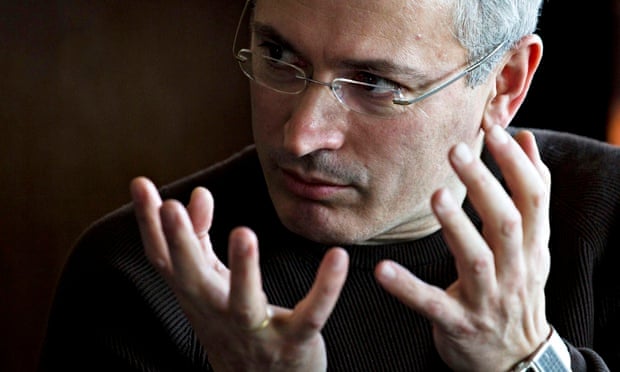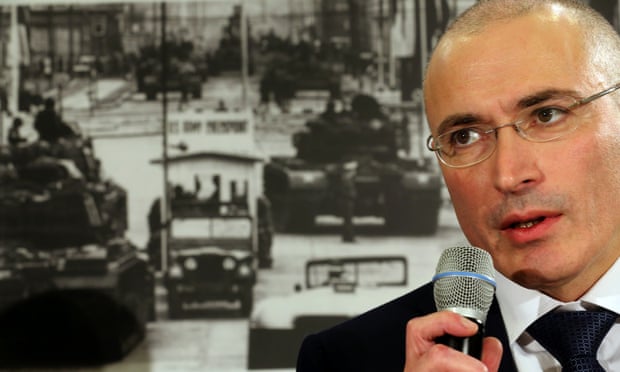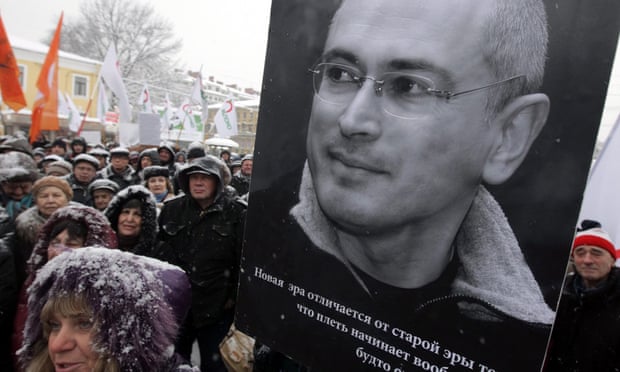Sunday, 30 August 2015
Gen. Hamid Gul
Khordokovsky
Mikhail Khodorkovsky on life after prison and Russia after Putin

He was Russia’s richest man, and then its most high-profile prisoner. Now, a year after Vladimir Putin pardoned him and released him from jail, Mikhail Khodorkovsky is living in Zurich and plotting the downfall of the man who put him behind bars for a decade.
“I will work to make sure the regime in Russia changes,” he says. “The question is: am I prepared to go all the way? And yes, I am prepared to go all the way.”
The Guardian’s meeting with Khodorkovsky takes place in a handsome but functional five-story building in central Zurich which serves as his office. He appears with a big pair of headphones round his neck and a black rucksack over his shoulders. The top-floor views of the River Limmat and the spires of central Zurich are a far cry from what he had to get used to for a decade.
“When I look back now, I can’t believe that a year ago I was in [prison] and didn’t think I’d ever be set free,” he says, pausing to eat slices of dried banana from a bowl on the table. “I thought there would be a third case.”
Putin announced that he planned to free Khodorkovsky on the sidelines of his marathon pre-Christmas press conference last December. It came as a surprise: there had been murmurings that a third criminal case was being prepared in order to keep the former oligarch locked up. But, beneath a cloak of secrecy, Khodorkovsky was whisked from his prison cell that night and put on a plane to St Petersburg, where he switched planes on the tarmac to a waiting aircraft that flew him to Berlin.
Khodorkovksy says he promised Putin three things in a handwritten letter asking to be freed so he could see his mother, who was terminally ill: that he would leave Russia to spend time with his family, would stay away from politics, and would not attempt to win back his shares in Yukos – his dismantled oil company – or get involved in any court cases.
Until late in the summer, when his mother died, he was indeed silent, but now he has set up a foundation called Open Russia and has been making political statements.
“It’s true I don’t want to get involved in politics,” he claims. “I want to support people who share my values, and that’s what I’m doing. In Russia, they call that politics, OK, well fine,” he says. He claims that by “changing the regime” he does not necessarily mean Putin – in the unlikely event that Putin decided tomorrow he wanted to completely change his style of rule, Khodorkovsky says he would be happy to work with him. He also insists he personally has no burning desire to be president: “I can’t really say that I am really interested in doing that, but if people ask me, then yeah, OK, I’m ready.”

But he surely knows that suggesting, however obliquely, that he might like to be president is not going to go down well with Putin. The last time Khodorkovsky dabbled in politics, he was arrested and spent the next 10 years in prison. While there is no doubt that most of the people who got rich in 1990s Russia committed a multitude of sins, there was also little doubt that the proceedings against Khodorkovsky were political. Is he really ready to take on the Kremlin again?
His office in Zurich is just a few blocks from the house where Vladimir Lenin lived for a year until April 1917. The Bolsheviks at the time were a marginal group with little support in Russia, and Lenin’s pontificating from Switzerland seemed something of an irrelevance. Within a few months of being dispatched to Russia by train, however, Lenin had deposed the provisional government and become the new leader of Russia.
In modern times, however, the character with most parallels to Khodorkovsky is Boris Berezovsky. Both men grew fabulously wealthy through the dubious and unjust privatisation process in the 1990s, and both were close to the Kremlin. Berezovsky, who was Putin’s political mentor, fell out with his protégé and fled to London, where he died in an apparent suicide in 2013.
“To turn into someone like Berezovsky, as well as the physical circumstances you also need to have the internal predisposition to this kind of situation. He was a real opportunist, whereas I am more of a pragmatist. I am used to running businesses. I am used to setting realistic goals and achieving them. Sometimes they are major goals, sometimes minor ones, and sometimes achieving them takes longer than I thought. But they are always pragmatic goals, pragmatic steps and carefully planned movement towards the goal.”
To this end, Khodorkovsky says he spent most of his time in prison thinking about what Russia should look like after Putin.
“It was very difficult over 10 years to take part in all these processes with predetermined results, in all these little insults, which happened later on in the camps. So I gave myself intellectual exercises, and set to work thinking about what mechanism there should be for the transition period. Where we need to get to is clear enough: a state governed by the rule of law. Full stop.”

On the specifics, however, he is vague. How a new government would come into place – through revolution or negotiation – he declines to say. Whether there should be criminal prosecution for current regime figures, he also says should be decided later.
“We will discuss this a lot, we have time. I think there will be a lot of discussion.”
He talks about a transition period of two or three years in which he would be prepared to be president, but again, the mechanics of this are vague.
Even in sleepy Zurich, the Kremlin is never far away. The Russian special services make it clear they are monitoring Khodorkovsky’s communications, he says: if he asks someone to take a document to Moscow, that person will stopped at customs and subjected to a search. At his public events, there are often uninvited guests.
“You can tell them by the questions. Sometimes they introduce themselves, sometimes they don’t. Sometimes the local guys tell me: ‘Ah, your lot have come again’. They know everyone here, it’s a small country.”
He is not visibly followed, he says, but is aware of the risks of vocal opposition: “I understand perfectly well that if Putin gives the order to have me removed, I will be removed. What else is there to say? But given I’m his personal opponent, it would be a very public gesture. I don’t know how much that would stop him, when you think about what has happened in Ukraine. But let’s hope that some kind of rules of the game remain in force.”
Khodorkovsky speaks with quiet determination, but also a studied indifference. He says he has neither the time, nor the desire to continue his prison diaries, and insists he has no dreams, no flashbacks to his time in jail. “I’m completely calm. It happened, so, whatever. Time to move on.”
It is nice to eat good food, he says, but insists he was not that bothered by prison fare. “I’m a pretty easy-going person. Whatever you feed me, I’m fine. So I didn’t really suffer from prison food, although really you could only call it ‘food’ in the sense that it had calories in it.”
As for things which surprised him when he emerged from the electronics-free vacuum that is Russian prison, Khodorkovsky says most things he understood, but after a decade locked up, the power of social media had been the biggest shock.
“I read 200 pages a day, so I had a theoretical understanding of everything that was happening, even of iPhones. The phenomenon of social media came as a surprise to me, though. I knew that these things exists, but to understand the influence it has had on humankind, you have to really feel that.”
He claims that one advantage he has gained from his time in prison is patience.
“Prison taught me that time does not have as much significance as we think. Just because something didn’t happen today doesn’t mean it won’t happen tomorrow,” he says. “There is no rush. Ten years is not a long time. For me, 2024 is not a long time away. There is a plan for these years. And if everything will happen the right way, I will implement it.”
Saturday, 29 August 2015
Freemasonry and Pirates
by Harry Kenison M.M.
The Scottish Rite's New Age Magazine
April 1961

Mithraism expanded with the conquests of the Persian armies, and as the mighty Persian war machine spread victoriously through Syria, Chaldea, Galatia, and Asia Minor, the fame and influence of Mithra grew proportionately, Even after the defeat of Darius, the famed Persian ruler and general, Mithraism gained in popular acceptance in opposition to the Hellenizing culture of the Greeks.
Mithra was not too highly regarded or accepted in Greece. This lack of popularity was primarily based on the antipathy of the Greeks for the Persians as the result of early and well-remembered wars. This antipathy, however, was restricted almost exclusively to Greece, for the domain of Mithra by the beginning of the Christian era extended from the Indus River in the east to the Black Sea on the west and north. It was widely accepted in the plateau countries of Asia Minor, and came to be recognized by the Romans in the land of Paul's birth as the religion of the Cilician pirates.
The Roman, not being of the temperament to countenance for long the bold effrontery of the Cilician pirates, made short work of them, but the cult of Mithra was infectious, and the prisoners and slaves taken by the Romans quickly introduced the cult to the capital city. Thus, Mithraism, which was not widely acknowledged outside the Orient during the Hellenic period, had by about the beginning of the second century become known throughout all Italy. The gospel of Mithra was well-established in the city of Rome by the time Paul of Tarsus arrived there.
At approximately this same time there was a general acceptance of Mithra by the army, and homage was paid him by the soldiers of the Third Legion. Contact with those in the Roman provinces throughout Asia Minor had further introduced Mithraism to both Roman citizens and soldiers alike.
It was the mysteries of Dionysos that held an attraction for women at this time, largely because the ceremonies of Mithra were restricted to men. The cult of Mithra contained a special interest for Roman soldiers, for Mithra himself had been for centuries a god of battle, and his was a strong masculine cult appealing to reverential and superstitious soldiers. The soldiers required an assurance of divine protection and courage in their constant contact with the foe. As the legions advanced, so did Mithraism. It soon became the recognized religion of the Roman army and spread in two centuries to the farthest limits of the Roman Empire.
As the Roman legions forced their way into Germany, France and Britain, they were accompanied by groups of builders or masons who erected bridges, aqueducts, and fortifications as demanded by the soldiers or by the provinces they occupied. It is, then, possible that the similarity between some aspects of Masonry and Mithra could stem from this source.
Little is known of the secret ceremonies of Mithra, and much that we have on the mystery has been deduced from the little factual evidence and is not entirely reliable. We are aware, however, that the worship of Mithra was no simple ceremony or initiation. Knowledge of this has been taken from prejudiced Christian sources opposed to the competitive cult of Mithra. They have indicated Mithraism consisted of seven stages or degrees, ranging from the lowest, the Raven, to the highest, the Father or Pater. Between these two grades were the degrees known as Occult, Soldier, Lion, Persian, and Courier of the Sun.
The initiation ceremonies have been described as beginning somewhat as follows: In the first degree the initiate wears the mask of the raven, and, enveloped in total darkness, he enters a cavern which is intermittently illuminated by flashes of light representing lightning. In the occult ceremony he wears a veil and enters a door into a den of tigers, hyenas, and other simulated wild beasts. The initiate was presented a mask for each degree and conducted through several caverns in which methods were employed to instill fear and horror. In the seventh cavern, the darkness was changed to light, and the initiate was brought before the chief priest, who was seated on a splendid throne and surrounded by assistant dispensers of the mysteries. He was also subjected to a grim fast, required to swan a raging torrent, and exposed to the solitary terror of the desert wilderness. It is said that be was finally beaten with rods and then buried up to the neck in snow.
It is known that the Christian Fathers especially delighted in elaborating and condemning these rites and to expose them as "tortures" and the "eighty punishments" by water, fire, frost, hunger, thirst, and prolonged journeyings of increasing hardships and severity.
The candidates took oaths of binding secrecy and were given an obligation which included sacred words known only to the members of the cult. The initiate was presented with a conical cap, loose tunics on which were depicted the celestial constellations, a belt containing the representations of the Zodiac, a pastoral staff, and a golden serpent was placed on his bosom as a symbolic sign that he had been regenerated and initiated as a disciple of Mithra.
Outstanding among the ceremonies of Mithra was a simulated murder, apparently performed on the candidate. It is supposed that death was the logical preliminary to a renewal of life and the possible representation of a transvaluation of all values. The priests of the early regeneration ceremonies acknowledged that only the select few among the initiates could master the ultimate secrets embodied in them. Murder was an obvious start toward a regeneration, in fact so apparent that it is said the emperor Commodus polluted the rites by a real murder when a certain thing was to be done for the sake of inspiring terror, probably in the third, or soldier, grade of the initiation.
Also distinctive in the Mithraic ceremonies were baptism and ablutions of various sorts. Two types were the marking of the forehead and complete immersion, and it is believed that they promised purification from guilt. The Christian Fathers, quick to notice the similarity, charged the devil with plagiarism.
Provision was also made in the Mithraic ritual for the nourishing of a new spiritual life. At initiation, honey was placed in the mouth of the candidate, in both the Lion and the Persian grades of initiation. It was also customary to put honey in the mouths of new-born children; so in Mithraism the spiritually new-born were fed honey, it is said. Honey was of both mystical and practical value for the priests of Mithra.
There is archaeological evidence indicating a communion including bread and wine, of which the Mithraic initiates partook. The bread consisted of tiny leaves, each distinctively marked with a cross. The participants ate the bread and then drank the wine from a cup. The Christians of the day, noting the likeness, accused the demons of thievery. Both ceremonies, Christian and Mithraic, were believed to have been memorial services celebrating the divine, and it is known that Mithra, at the close of his redemptive career and just before his ascension to heaven, partook of a last supper with his companions.
The conception of Mithra himself was an ethical one, his name in Sanskrit meant "Friendship," and in the Avesta "Compact." As a result of Mithra's alliance with Zarathustra, his ethical character was accentuated and he was a special guardian of truth and light as opposed to evil or darkness. There were also certain commandments which the candidates were careful to observe to assure salvation with Mithra or the sun, with which he was identified.
Mithraism has shown that the cult offered its devotees the hope of immortality and an assurance of victory in the struggle for life. Feeding the initiate honey and his participation in a sacramental communion both stressed outwardly the idea that initiation was a rebirth to a new life."
1938 - The Gathering Storm
In the course of the night we stood on the terrace of the Berghof with Hitler and marveled at a rare natural spectacle. Northern lights of unusual intensity threw red light on the legend-haunted Untersberg across the valley, while the sky above shimmered in all the colors of the rainbow. The last act of the Gotterdammerung could not have been more effectively staged. The same red light bathed our faces and our hands. The display produced a curiously pensive mood among us. Abruptly turning to one of his military adjutants, Hitler said: “Looks like a great deal of blood. This time we won’t bring it off without violence.”
Friday, 28 August 2015
The House of Schumer, and FBI are (still) Stupid
Amy Schumer fights for tougher gun laws after ‘Trainwreck’ shooting





























